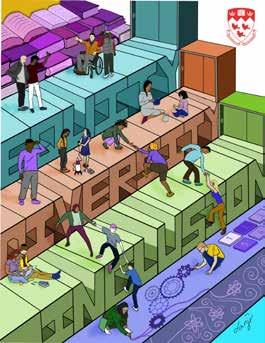
5 minute read
Une année d'engagement étudiant contre la discrimination
par Karell Michaud
À travers des temps turbulents, les membres de la communauté étudiante brillent par leur engagement visant à favoriser une société plus juste et équitable pour et toutes. Nous présentons trois initiatives ayant laissé leur marque à McGill, Montréal et au-delà. Ces initiatives tombent à point, entre autres puisque l’Université McGill a déposé son plan de lutte contre le racisme anti-noir à la fin de septembre 2020.
Advertisement
UNE INITIATIVE CITOYENNE POUR REFLÉTER LE VRAI VISAGE DE MONTRÉAL
Balarama Holness, 4L
En novembre, le finissant en droit Balarama Holness a annoncé qu’il présenterait sa candidature aux prochaines élections municipales de Montréal. Cette annonce vient boucler un périple qui a débuté lors des élections municipales de 2017, au cours desquelles l’ancien joueur des Alouettes a perdu la course comme maire d’arrondissement dans Montréal-Nord.
Bien que plus du tiers de la population montréalaise appartienne à une minorité visible, on n’en retrouve que 7 % parmi les élus municipaux, et 6 % parmi le personnel de la Ville. Au lendemain de sa défaite électorale, Holness a lancé l’initiative « Montréal en action » afin de mettre en lumière cette nette sous-représentation. Un groupe d’une cinquantaine d’activistes s’est rallié à l’objectif de déclencher une consultation publique sur le racisme et la discrimination systémique à Montréal. En vertu du droit d’initiative prévu par la Charte montréalaise des droits et responsabilités, l’armée de bénévoles a entamé en 2018 la récolte des 15 000 signatures nécessaires afin de forcer la tenue de la consultation, malgré la résistance du gouvernement. Quatre-vingt-dix jours plus tard, Holness et son équipe déposaient à l’hôtel de ville une pétition endossée par plus de 22 000 signataires, amorçant ainsi la deuxième initiative citoyenne fructueuse de l’histoire de la Ville.
Après une vaste consultation communautaire ayant impliqué plus de 7 000 intervenants, l’Office de consultation publique a rendu public en juin 2020 un rapport accablant sur le racisme systémique dans la métropole, accompagné de 38 recommandations. Quelques semaines plus tard, Holness se retrouvait dans les manchettes du New York Times, présenté comme « l’activiste aspirant à devenir l’Obama canadien ».
« Bien humblement, je suis loin d’un Obama, confie Holness, mais je me reconnais dans ses racines d’organisateur communautaire ». Plusieurs traits communs — dont le fait d’avoir tous deux suivi des études juridiques — incitent par ailleurs à la comparaison avec l’ancien président américain, qui figure parmi ses idoles. À la veille d’un nouveau chapitre de sa vie politique, Holness promet d’œuvrer pour rendre Montréal plus inclusive pour tous — après avoir terminé ses examens finaux, bien entendu.
TELLING THE STORIES OF RACISM IN THE PANDEMIC
Lily Maya Wang, 4L
At 2 AM one night in April, Lily Maya Wang (pictured below) found herself unable to sleep. It wasn’t the stress of her upcoming finals that was keeping her awake, nor the anxiety of living through a global pandemic. Earlier that day, people around her had shared multiple incidents of flagrant racism directed against people of Asian descent that had occurred since the beginning of the pandemic. “My heart ached,” she recalls. “Out of a sense of urgency and tremendous sadness, I decided to act, instead of lying awake.”
She first reached out to fellow members of the Faculty’s Equity Committee. They gathered testimonies of racist behaviour and micro-aggressions, and submitted a letter to the dean that included a hundred signatures from the student body. The Committee issued two statements regarding COVID-related anti-Asian discrimination and systemic racism, including anti-Black racism, to bring awareness to these issues.
Along with a fellow Montrealer, she also undertook collecting stories throughout the city to bring the issue of anti-Asian racism to the attention of the broader public through news outlets and Montreal’s city councillors. After a long media journey that led her to take part in a press conference with the Chief Commissioner of the Canadian Human Rights Commission, Wang saw her efforts rewarded in July when Montreal city council unanimously approved a motion denouncing “acts of hate, discrimination and violence directed against Montrealers of various Asian origins.”
Throughout the traumatizing process of collecting stories of everyday racism, Wang confides she held tightly to one of her favourite quotes: “The arc of the moral universe is long, but it bends toward justice.” Now in her final year of studies, she feels that the lifelong goal she had laid out in her application to McGill Law holds truer than ever: “to learn powerful tools and find effective solutions for some of the greatest challenges of our times.”

Lily Maya Wang
DAVE SIDAWAY / MONTREAL GAZETTE
DRAWING A PATH TOWARDS GREATER INCLUSION
Olivia Ma, 3L
Danji is the English translation of 丹琪 (Dan qí); it is the first English name under which Olivia Ma (pictured below) went by when her family immigrated to Canada. It is also the signature that appears on the artwork Ma created to illustrate McGill’s Equity, Diversity & Inclusion (EDI) Strategic Plan.
“Signing off my art as Danji, I remind myself of who I was as a young child, my most honest and transparent self,” Ma shares. “It is also an homage to my Chinese identity.” Having developed her technical skills in different artistic media since she was a child, Ma’s practice took a turn towards greater self-expression and reflection in the last two years.
In 2020, Ma was commissioned by McGill’s Equity Office to create an artwork for their strategic plan. “Professor Angela Campbell and I wanted all people to be represented, but more importantly to illustrate a sense of collaboration and community support.”

In 2020, Olivia Ma was commissionedby McGill’s Equity Office to createan artwork for their strategic plan.
Ma views any generation’s collective art as a snapshot of its values, fears, hopes and dreams. “Art gives us insight into why people want social change by representing feelings of pain and suffering, love, disappointment, trauma, ecstasy, hope and peace,” she says. “Art, society and culture have always been and will always be in continuous dialogue.” While highlighting that social change brought through art takes time to materialize, she humbly confides her pride in doing her part to ensure that all people feel represented and included. “I feel so lucky to have played a small role in promoting equality, diversity and inclusion within the McGill community,” she says.

“During the height of the Black Lives Matter movement, I felt a responsibility to contribute,” explains Ma. “Through the black panther surrounded by names of victims of police brutality, I wanted to illustrate the strength of the Black community in the face of injustice. The colour yellow and the border style were chosen to illustrate the Asian community’s support, and the self-reflection we need to have on anti-Blackness in our own communities.”
Olivia Danji Ma
The painting will be auctioned in February 2021 and all proceeds will be donated to Montreal in Action. Email olivia.ma@mail.mcgill.ca to sign up for updates.










